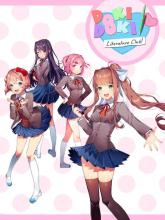Rating of
3.5/5
Doki-Doki Deconstructionism
Nelson Schneider - wrote on 10/21/17
The Visual Novel is, as a type of novel, the latest evolution of a form of storytelling that has existed since at least the first century of the Common Era. While the Ancient Greeks are far better known for their poetic, multi-act plays and the invention of poetic meters such as ever-popular iambic pentameter, they also managed, despite the decadence of the Mediterranean world during the decline of the Old Roman Empire and the rise of the Roman Catholic Church, to create the template for the prose romantic novel, which helped to influence medieval writers – including Shakespeare – with a storytelling template that still finds regular use 2000 years later. These simple ‘boy meets girl’ tales, filled with trials and tribulations (and often pirate kidnappings) are incredibly trite, but that doesn’t prevent Visual Novels from casting themselves from that very same mold, despite the Visual Novel’s official origin in Japan.
Deconstruction is a mid-20th-Century form of philosophical/literary analysis (though its staunchest proponents would deny even the use of the term ‘analysis’ to describe it) that aims to attain the truest meaning of a work by essentially ‘cracking it open,’ or tearing it apart and mulling over the meaning and intent and, indeed, the very truth of the contents within. I never got much out of the literary analysis classes I suffered through in college, but I think that is largely because the works being analyzed were stiff, boring, tired old chestnuts that held no real meaning for me, thus picking apart their meaning ultimately meant nothing to me.
Oddly enough, “Doki Doki Literature Club!” (“DDLC”), a Free2Play Visual Novel by Team Salvato – an Indie outfit led by an ex-‘Super Smash Bros.’ modder and erstwhile tournament whore – brings Literary Deconstruction to the gaming crowd, disguised – oh, so cleverly – as the most banally generic Dating Sim/Virtual Novel among the slew of nearly-indistinguishable titles added to Steam on a daily basis. I never would have played this game had Chris not recommended it to me – repeatedly and insistently – over the course of a week, brimming with uncontained excitement.
Presentation
“DDLC” does its best to keep itself under wraps until it’s ready to spring its Deconstructionist traps. Therefore, it looks and sounds very much like the most generic, middling-quality Visual Novel ever assembled on a shoestring budget in an attempt to seduce some hikikomori or weeaboos into dropping (their parents’) money on it. The backdrops are bare-bones quality, and the static character portraits of the girls the player interacts with are devoid of animation and generally lacking in different poses. The menus employ large amounts of pink and other pastel colors, as well as a ‘bubbly’ texture that plays into all of the stereotypes and memes one would expect from the genre.
The audio is fairly basic. The girls aren’t fully voiced (which would have actually been an impressive feat)… or even partially voiced. The only time we hear any of them speak is during the vocals of the closing credits theme song. The soundtrack, though, is incredibly well-done, which is doubly impressive because the lead writer also was the lead composer. I’m jealous…
Story
“DDLC” presents itself as a typical, banal Visual Novel where a Loser Hero (the player’s custom-named male [and only male] avatar) who attends a Japanese high school must content for the affections of a stable of Female Stereotypes: Girl Next Door, Tsundere, and Yandere. (If you don’t know what those Japanese words mean, look them up. I’m not your babysitter!) And, indeed, the first Act of this three-act story is painfully dull and stereotypical. However, at the end of the first Act, everything changes as the Deconstruction starts… and that’s all I have to say about that.
The writing in “DDLC” is actually very well-done, with tons of foreshadowing and hints of things to come, as well as callbacks to prior events. However, I don’t really think it’s as ‘disturbing’ as it makes itself out to be. From the outset, the player is informed that the game is classified as ‘Psychological Horror,’ which is really about the only kind of Horror I can tolerate, as it doesn’t rely on jump-scares or copious amounts of explicit gore – both of which I despise. Plus the splash screen warns that people who are ‘easily disturbed’ shouldn’t play it. I honestly can’t fathom the type of autistic Millennial snowflake that would actually be ‘disturbed’ by the Deconstructionist elements of “DDLC”… oh, wait, I just did.
Playing through the game took me almost exactly 4 hours. Bear in mind, though, that there is a ‘good’ ending that requires the player to jump through a few hoops, but is largely indifferent from the ‘normal’ ending. But there’s replay value in that, eh?
Gameplay
“DDLC” really has poor gameplay even by Visual Novel standards. While most Visual Novels are essentially just ‘Glorified Dialog Tree: The Game,’ “DDLC” doesn’t have all that many branching paths. Instead, it relies on a gimmicky ‘Poetry System,’ by which the player composes poems that can appeal to the game’s woo-able heroines based on the words they contain. This system is incredibly shallow and boring (Deconstructing the fact that Visual Novels are usually?), as the words the player can pick from are never actually assembled into a readable poem – the contents of the player’s poetics are strictly implied.
The other noteworthy thing about “DDLC’s” gameplay is the sheer amount of cryptic hints and clues that relate to things outside the game. I haven’t seen this much stuff to get cryptographers and conspiracy nerds riled up since Phil Fish tried to be oh-so-clever with the final puzzle in “FEZ.” There is no way in Hell I ever would have found or deciphered these extraneous things on my own, but reading online about other people doing it took about as long as it took to play through the game. I’m jealous…
Overall
“Doki Doki Literature Club!” is unique, a Deconstructionist take on the very form and genre of the Visual Novel, which is really the only thing that makes it interesting. It’s free. It’s short. Play it to kill an afternoon in your meaningless existence. Or don’t. Whatever, I don’t care.
Presentation: 3.5/5
Story: 4/5
Gameplay: 2/5
Overall (not an average): 3.5/5
Recent Comments
Chris Kavan - wrote on 10/24/17 at 05:29 PM CT
Doki Doki Literature Club! Review comment
Just Monika. (Glad you sorta kinda liked it anyway!)





